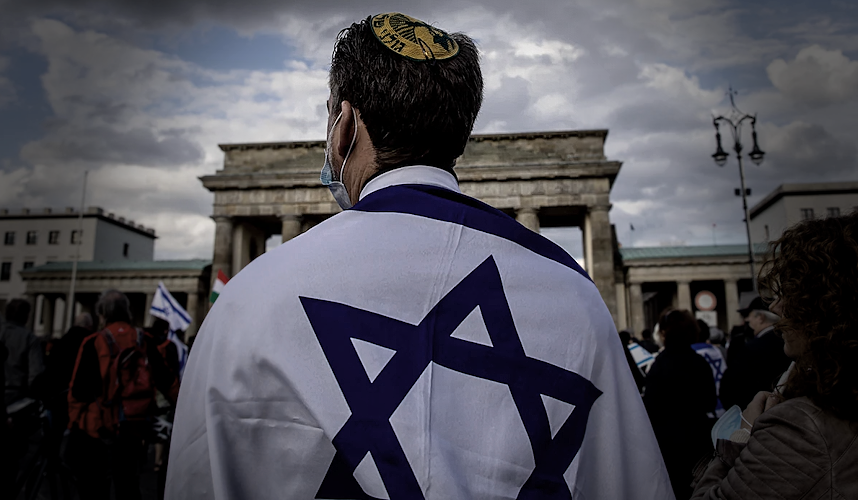
Discussing the collapse of Zionism, as is becoming increasingly self-evident, requires revisiting how it began, for its very foundations were always unstable, both morally and politically.
Though often romanticized, particularly in the West, as a “movement of liberation,” Zionism was in fact a European political project.
It chose Palestine not because it was uninhabited, as logic and justice should have demanded, but because it was symbolically charged, rich in imperial utility, and ripe with colonial opportunity.
In the late 19th century, as antisemitism surged across Europe, some Jewish intellectuals proposed a radical solution: to establish a separate homeland for Jews.
But rather than confronting antisemitism within Europe itself, which would have been the most moral and necessary course, the movement instead sought to export the so-called “Jewish question” eastward.
This was an evasion of accountability: instead of reforming Europe’s own violent structures, the burden was shifted onto another innocent population.
What followed was the tragic transformation of victims into agents of displacement. Jews, long persecuted in Europe, were now being positioned to colonize another people, with imperial approval.
Palestine was not empty. It was home to a thriving indigenous Arab population—Muslim and Christian alike—who had lived there for centuries. But it held powerful biblical resonance for Jews and Christians alike.
That emotional symbolism, more than any practical logic, sealed its selection.
Other options—Uganda, Argentina, even parts of Sinai—were considered and discarded.
Yet, Palestine had mythic appeal. And more importantly, it had Western Christian backers, particularly in Britain, who believed the Jewish “return” to the Holy Land would hasten divine prophecy.
The result was a project that advanced not through dialogue or consent, but through colonial fiat.
In 1917, the British government (then at war with the Ottomans) issued the Balfour Declaration, promising a “national home for the Jewish people” in Palestine, a land Britain didn’t yet control and whose native inhabitants were never consulted.
When Britain took control after World War I, it opened the door to mass Zionist immigration and land acquisition, often dispossessing Palestinians in the process.
Zionism, therefore, was not born as a movement of peaceful coexistence. It was, from the outset, a settler-colonial project.
It cloaked itself in the language of refuge and justice, but operated through a logic of dehumanization, displacement, and domination.
This original sin—the erasure of Palestine’s people—has marked every single chapter of Zionism since.
And today, in its final phase, that logic is no longer masked. It is exposed. Brutal. And increasingly unsustainable.
As Israeli historian Ilan Pappé observes, this “last chapter” of Zionism is often the most dangerous.
But this is not because it departs from Zionism’s original trajectory, as the historical record clearly shows. It is dangerous because it accelerates that trajectory with unprecedented intensity.
What was once spread across decades—settlement, erasure, domination—is now being executed in compressed time and with open impunity. Violence has not changed in nature.
It has changed in scale and tempo. The machinery of dispossession is no longer gradual. It is all-consuming.
Though already metastasized before it was born, Zionism has continued to mutate through successive phases.
From political Zionism under Herzl, to Labor Zionism under Ben-Gurion, and now to the religious-nationalist messianism of Netanyahu’s current coalition, the project has undergone radical transformation.
Today’s neo-Zionism has abandoned even the pretense of liberal democracy. This is not an evolution. It is a rupture.
If Zionism’s logic has always been so transparently ugly, how did it sustain itself for so long?
What has allowed Zionism to thrive in its modern form was not internal consensus, but external protection, namely, unconditional US military, diplomatic, and financial support.
The project, midwifed by British imperial strategists, was later adopted—almost seamlessly—by the United States as part of its own postwar hegemonic architecture.
Zionism became an instrument of empire, wrapped in moral rhetoric but rooted in power. That shield, however, is now visibly cracking.
The genocide case filed by South Africa at the International Court of Justice (ICJ) marked a global turning point. From Latin America to Southeast Asia, states are beginning to speak the language of accountability.
The Boycott, Divestment and Sanctions (BDS) movement is gaining legitimacy. Even within Jewish communities globally—once the uncritical backbone of Israel’s legitimacy—there is an unprecedented rupture.
Movements like Jewish Voice for Peace and veteran whistleblowers like Breaking the Silence now lead moral resistance from within.
What once rested on Holocaust memory and Western political alignment now rests primarily on American firepower. And that, too, is beginning to erode.
What many observers fail to understand is that US support for Israel is not simply a matter of policy—it is a matter of institutional inertia.
There is now clear and documented evidence that senior officials in Washington have resigned in protest over arms shipments to Israel.
Zionism has reached its civilizational limit. It no longer sustains itself through ethical argument or democratic ideals.
Josh Paul of the State Department publicly opposed what he called “shortsighted, destructive, unjust” weapons transfers.
Other senior civil servants have filed dissent cables.
US military officers have applied for conscientious objector status. And yet, the weapons keep flowing.
This reveals something deeper: the real power in US doesn’t lie at the top, but in the layers below.
The US military-industrial complex—this entanglement of defense contractors, Pentagon channels, and congressional appropriators—continues its operations with or without presidential coherence.
This is what explains why peace overtures, especially from Trump, appear erratic or contradictory.
To maintain the image that he remains in control, he cannot admit that arms shipments occur beyond his command. But that is precisely what they do.
When a system cannot follow its own directives, it is no longer a coherent empire. It is a splintered organism in decline.
Arms keep flowing not because there is consensus, but because the machine can no longer stop itself.
This is not strength—it is entropy. The collapse begins not with a bang, but with institutional autopilot.
This reflects the very pattern outlined by Daron Acemoglu and James Robinson in “Why Nations Fail.”
Empires do not collapse because of sudden defeat, but because their institutions become extractive, self-serving, and unaccountable.
When elite networks capture power and refuse reform, they hollow out the very structures they depend on.
In the United States, the military-industrial complex now operates independently of public will or presidential control. And Zionism, which has relied for decades on this machinery of support, will not survive its eventual breakdown.
As American institutions falter under the weight of corruption, polarization, and global overreach, Israel’s last shield will erode. And with it, the illusion of permanence.
Therefore, Pappé’s insight—that we are witnessing Zionism’s last, most ruthless phase—is not hyperbole. It is the only way to explain a project that now survives on unsanctioned violence, systemic sabotage, and global moral isolation.
Inside Israel, the crisis is no less acute.
The ideological divide between secular liberals and religious ultra-nationalists has widened into an existential chasm.
Weekly mass protests against judicial reform signal that large segments of Israeli society no longer trust the state’s democratic viability.
Youth emigration is rising, and with it, a growing brain drain, as some of the country’s most educated and skilled individuals seek futures elsewhere.
Military cohesion is fraying. A generation raised on siege logic and dehumanization is beginning to turn inward.
This is not merely social unrest. It is structural unravelling and the unmistakable decay of a system losing internal coherence.
And yet, through this collapse, a different future becomes imaginable. Palestinians—long framed solely as victims—are emerging as agents of historical continuity.
Their endurance has outlasted every phase of Zionism. Their cause has withstood displacement, denial, and demonization. It now stands at the center of global consciousness.
Zionism, by contrast, has reached its civilizational limit. It no longer sustains itself through ethical argument or democratic ideals—but through brute force and the myths of the past.
Its geopolitical scaffolding is splintering. Its internal contradictions are accelerating. And its survival is now tied to a world order that itself is losing coherence.

(Dr Rais Hussin is the Founder of EMIR Research, a think tank focused on strategic policy recommendations based on rigorous research.)
ADVERTISEMENT
ADVERTISEMENT






































